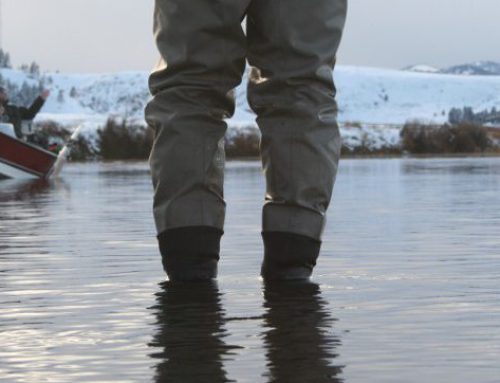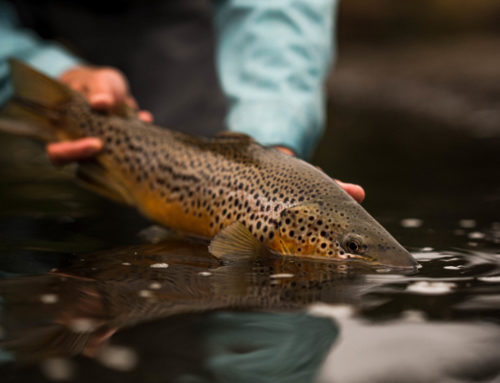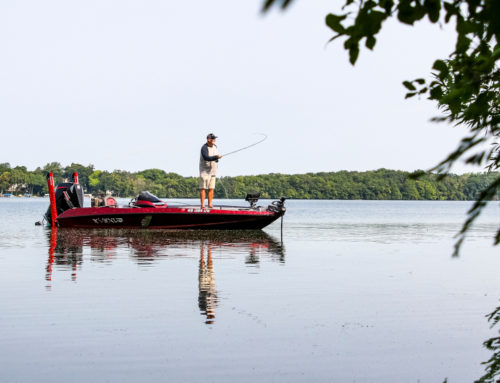Are you new to fly fishing and want some help? Our own Carla Stephens, who recently began her fly fishing journey, shares some good insight about fly fishing tips for beginners.
Here are 10 top fly fishing tips for beginners from a beginner.
Fly fishing is a beautiful and challenging way to catch fish. It is no surprise that more and more people are becoming interested in the sport. But like any other hobby, fly fishing requires some knowledge and experience to be successful. Compared to many of my coworkers at onWater, I am fairly new to fly fishing. I love being outside and experiencing nature. If my fly fishing is good enough, catching a fish is just an added perk.
Here are my top 10 tips for newbies.
Know the rules, regulations, and license for your area
It is very important to ensure you know the rules and regulations for where you plan to fish. It is also extremely important to carry the proper fishing license with you. I always keep a hard copy of the current regulations in my vehicle and another copy with all of my gear. Before the onWater app I had to look at a lot of websites to get regulation and license information. The onWater app has license and regulation information for every waterbody I might want to fish. With the app I can be sure I am legal and know the rules.
The Right Gear Matters
Fly fishing requires a rod, reel, line, leader, and tippet. Also important are flies, tackle, and a few other accessories like fly floatant and strike indicators. Using the right gear can make a huge difference in your success. When choosing gear, don’t skimp. You may not need the most expensive equipment right away either. A lot of beginners choose a basic setup and upgrade as they gain more experience. The fish do not care if you have the newest set of waders or a shiny new fly rod, and your angling friends probably won’t be looking at your gear either. So start with something you like, that is comfortable, and in your price range.
Now that you’ve got the right gear, you need to know where to fish. Knowing where and when you can fish will help ensure you have a good experience. Having the right map is often as important as the right fly. Often overlooked by beginning anglers, maps are very important. Until recently anglers needed an array of maps and books, but with onWater hundreds of maps and thousands of access points are available in the palm of your hand.
Learn to Cast Properly
Casting is probably the most important skill in fly fishing. Learning to cast properly will make a big difference in your ability to catch fish. Take the time to learn the basic techniques, and practice until you can cast accurately and consistently. Practice by casting in your front yard or going to a park with a grassy lawn. In fact you may make a new friend with a curious onlookers or meet a fellow angler. You can also look for local clinics or groups. The fly fishing community is full of helpful people that are excited to teach and help.
Understand the Fish You Are Targeting
Different fish species have different behaviors and preferences, and understanding the fish you want to pursue is essential for success. Learn about feeding behaviors and the habitat of your target species. Once you gain some insight, always be prepared to adjust your tactics accordingly, or you can plan before going and use the onWater map to look at the terrain and river course. You can also use onWater’s maps to e-scout it out prior to stepping in the water.
Practice Patience
Fly fishing requires a lot of patience. Don’t expect to catch a fish on your first cast or even your first day on the water. Take time and enjoy the experience and appreciate the beauty of nature. If you find yourself getting frustrated, take a break. Shoot some photos and investigate what bugs are hatching. Take the opportunity to learn about the area you are fishing.
Study the Water
Understanding the water you’re fishing is crucial for success in fly fishing. Pay attention to the current, depth, and structure of the water and be ready to adjust your presentation accordingly. Use onWater to look up the weather forecast and streamflows. You can also search for dam release schedules that are included on our river information page accompanying a map.
Be Prepared for Different Conditions
Weather and water conditions can vary greatly, and being prepared for different conditions can make a big difference in your success. Always bring appropriate clothing, and be ready to adjust your tactics based on the conditions. Dress in layers so you can take-off or put-on the appropriate layer based on changing weather conditions.
Always Remember: Safety First
Fly fishing can be a dangerous activity if you’re not careful. Be sure to wear appropriate safety gear. Wading boots offer support and traction to prevent falls. Sunglasses protect your eyes from errant casts. When in a boat it is wise, and sometimes required to wear a PFD (personal floatation device). When wading also be aware of potential hazards, such as fast-moving currents or slippery rocks. Before leaving for the day, let someone know where you are going and how long you will be out. I like to share my location with my husband or better yet, send a screenshot of the area you will be fishing in.
Learn to Tie Flies
Tying your own flies can be a fun and rewarding part of fly fishing, and it can also save you money. Invest some time to learn how to tie basic flies, and experiment with different patterns and materials. This is a great thing to do during the dark days of winter. It is rewarding to catch a fish with your own fly. Many local Trout Unlimited Chapters or Fly Fishers International have fly tying nights that are open to anyone.
Join a Club or Group
Fly fishing can be social activity–or at least it is fun to get together with other anglers and talk fishing. Joining a club or group can be a great way to learn from more experienced anglers and meet new people who share your passion. Several of these groups will do local volunteer work on rivers, gear swaps, or fly tying clinics. There is a wealth of knowledge and experience from groups and clubs, plus they like to have fun and be social.
This last one isn’t a tip. It is just the right thing to do: Respect the Environment
Finally, anglers have a responsibility to respect and protect the environment. Always follow local regulations and encourage others to do so. On many water bodies it may be best to practice catch-and-release to help conserve fish populations for future generations. Always pick up your unused line or clipped leaders, trash, cans and properly dispose of them. I keep a small mesh bag with a draw string top in my pocket. Its easy to pack away and nice to have on you when you find an empty can or small piece of trash. A small trash bag can ensure you leave a place better than you found it.
In conclusion, fly fishing is a challenging and rewarding sport that requires knowledge, skill, and patience. By following these tips and continuing to learn and practice, you can become a successful angler and enjoy this beautiful hobby for years to come. Fly fishing is a continuing education hobby–there is always something new to learn or a different way to do something.
It is meant to be enjoyable, relaxing and an excuse to just get outdoors–so don’t get too caught up being the best angler you can be as fast as you can. Just enjoy going fishing!
Be sure to read onWater fishing blog posts to plan better and fish smarter.
Three Ways Topo Maps Help You Find More Fishing Spots




